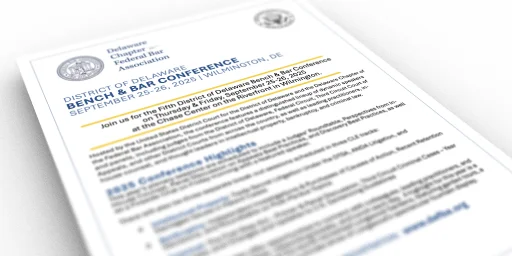
Whew! The 2025 District of Delaware Bench and Bar conference wrapped up on Friday (has it really been two years!?). It was a wonderful event, as always, and the organizers did an amazing job. All of the panels were great, but I particularly enjoyed Judge Andrews' incredible interview of Judge Bryson (and I heard the same from others).
The conference was especially fun for me this year, because I received a lot of in-person feedback about this blog. Thank you all!! One request was to keep our posts short, and I'll try to do that today.
For anyone who missed it, here are some notes from the conference, organized loosely by topic:
Judges, Visiting Judges, & the Court
- The District of Delaware was the busiest district court in 2024, according to the AO's report
- Chief Judge Connolly described the circumstances of the JUDGES act last year and its unfortunate veto
- The hope of new judges for the District of Delaware before 2029 are very low—even though the Court has the same number of judges as it had in the 1980's, when it had a drastically lower workload.
- A new magistrate judge position is unlikely
- Chief Judge Connolly explained that referrals to visiting judges will likely continue for some time, given the veto of the JUDGES act
- Civil cases may be transferred to a visiting judge, but will not be assigned to a visiting judge in the first instance. Visiting judges do not receive criminal cases.
- Visiting judges are handling 11.2% of cases
- Judge Bryson alone had 10 trials last year in the District of Delaware (!!)
- Judge Andrews, who has taken senior status, is no longer taking patent, Social Security, pro se, or bankruptcy cases, but is still taking other cases
- The Court has seen no change in settlement rates following the retirement of the magistrate judge ADR program
- There was some discussion of the potential for a new courthouse in the future, but the expectation is that would take a decade or more
Case Filings & Delaware As a Venue
- Patent cases are up 22% this year
- We are the busiest court when it comes to competitor cases, with 29% of competitor patent cases
- NPE cases have been moving to Texas, but it hasn't impacted the Court's workload
- In-House counsel tends to like Delaware because venue sticks
- Some noted the lack of a big time-to-trial differences between D. Del. and D.N.J. for ANDA cases
- One big difference from a judge's perspective between Delaware and Texas is in voir dire. This is well known among those who practice in both places, but E.D. Tx. permits attorneys to ask voir dire questions directly, unlike Delaware, and attorneys use it as a way to argue their case to the jury.
Delaware Counsel & AI in Filings
- There may be discussion at the Court in the coming months regarding the role of Delaware counsel
- The Court still values Delaware counsel and the Delaware counsel requirement is not going away
- Delaware counsel should be intimately familiar with the arguments and ready to jump in on the merits if needed
- (Some of this may relate to parties including AI filings in court briefs. Talking to attorneys at the conference and elsewhere, I've heard of three instances so far where parties included hallucinated citations in briefs, but I have seen no opinions, orders, or procedures on that topic yet.)
- Delaware counsel should help encourage parties to meet-and-confer, help keep the temperature down in meet-and-confers, and assist in resolving disputes (particularly scheduling disputes) before they have to go to the Court
- If there is feedback regarding the role of Delaware counsel, it should be shared via the Court's advisory committee
Procedures & Briefing
- Chief Judge Connolly flagged the possibility of some upcoming changes to the District Court's filing procedures for sealed filings
- The Court indicated some openness to referring cases to ADR before a magistrate judge, but emphasized that any communications about that should be by letter
- Parties should feel free to include highlighting in exhibits, and it is helpful to the Court
- Judges differed significantly on whether they want parties including back-and-forth e-mail traffic as exhibits to discovery disputes
- Proposed orders are often critical, and should include a precise description of the relief sought
- Generally, if there is a conflict in trial dates between a civil and criminal case, the criminal trial will take priority
As always, there was much more discussed than what I can list here, including panels on client perspectives, judicial commentary, views from Delaware Senator Chris Coons, and more. The conference is very much worth attending in the future, if you have any interest in litigation here in the District of Delaware.
If you enjoyed this post, consider subscribing to receive free e-mail updates about new posts.




